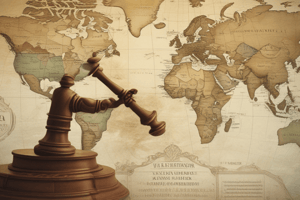Podcast
Questions and Answers
What is the primary purpose of extradition treaties?
What is the primary purpose of extradition treaties?
- To make extradition automatic for all nations.
- To ensure that nations have a duty to surrender individuals.
- To regulate the process of extradition between different nations. (correct)
- To provide immunity to criminals who flee to another country.
In cases of concurrent jurisdiction, which state typically has the stronger claim to investigate and prosecute?
In cases of concurrent jurisdiction, which state typically has the stronger claim to investigate and prosecute?
- The state that is geographically closer to the crime scene.
- The state that can provide the harshest penalty.
- The state that has historical ties to the crime.
- The state that has the subject in custody. (correct)
What principle relates to the obligation to extradite or prosecute?
What principle relates to the obligation to extradite or prosecute?
- Actus reus.
- Nullum crimen, nulla poena sine lege.
- Aut dedere, aut judicare. (correct)
- Stare decisis.
Which of the following is NOT an example of extraterritorial jurisdiction?
Which of the following is NOT an example of extraterritorial jurisdiction?
Which document established the legal framework for prosecuting genocide and war crimes post-Nuremberg?
Which document established the legal framework for prosecuting genocide and war crimes post-Nuremberg?
What principle authorizes a state to exercise jurisdiction over non-nationals for offenses committed outside its borders when these acts threaten national security?
What principle authorizes a state to exercise jurisdiction over non-nationals for offenses committed outside its borders when these acts threaten national security?
Which of the following defines nationality in the Nottebohm Case?
Which of the following defines nationality in the Nottebohm Case?
Which jurisdiction principle claims authority over crimes committed abroad by aliens against its nationals?
Which jurisdiction principle claims authority over crimes committed abroad by aliens against its nationals?
What is considered a controversial jurisdiction principle that views injuring a national as injuring the state itself?
What is considered a controversial jurisdiction principle that views injuring a national as injuring the state itself?
Which of the following is NOT a basis for determining a person's nationality?
Which of the following is NOT a basis for determining a person's nationality?
Which principle allows for the prosecution of individuals for crimes universally recognized as heinous, such as genocide and war crimes?
Which principle allows for the prosecution of individuals for crimes universally recognized as heinous, such as genocide and war crimes?
Which jurisdiction principle is grounded in the idea of reciprocal rights and duties between a state and its nationals?
Which jurisdiction principle is grounded in the idea of reciprocal rights and duties between a state and its nationals?
What is a major historical foundation of universal jurisdiction?
What is a major historical foundation of universal jurisdiction?
What was the primary legal principle used by the Israeli court to justify jurisdiction over Adolf Eichmann's trial?
What was the primary legal principle used by the Israeli court to justify jurisdiction over Adolf Eichmann's trial?
What type of immunity did Augusto Pinochet establish for himself before leaving office?
What type of immunity did Augusto Pinochet establish for himself before leaving office?
Which of the following states issued an arrest warrant for Augusto Pinochet in 1998?
Which of the following states issued an arrest warrant for Augusto Pinochet in 1998?
What is a fundamental constraint on a state's jurisdiction over foreign nationals?
What is a fundamental constraint on a state's jurisdiction over foreign nationals?
Under what conditions is expropriation considered a violation of international law?
Under what conditions is expropriation considered a violation of international law?
What does extradition refer to in international law?
What does extradition refer to in international law?
What was one of the reasons for the Israeli court's decision to prosecute Eichmann?
What was one of the reasons for the Israeli court's decision to prosecute Eichmann?
Which of the following best describes the concept of universal jurisdiction?
Which of the following best describes the concept of universal jurisdiction?
What does territorial jurisdiction allow a state to do?
What does territorial jurisdiction allow a state to do?
How does the subjective territorial principle differ from the objective territorial principle?
How does the subjective territorial principle differ from the objective territorial principle?
In the Lotus case, what was the primary argument presented by the French government?
In the Lotus case, what was the primary argument presented by the French government?
What principle allows a state to prosecute its own nationals for crimes committed anywhere in the world?
What principle allows a state to prosecute its own nationals for crimes committed anywhere in the world?
Which scenario exemplifies the objective territorial principle?
Which scenario exemplifies the objective territorial principle?
What was the significance of the PCIJ's ruling in the Lotus case?
What was the significance of the PCIJ's ruling in the Lotus case?
What is NOT included in a state's territory under jurisdictional authority?
What is NOT included in a state's territory under jurisdictional authority?
Which of the following describes the primary duty of a government regarding its territorial jurisdiction?
Which of the following describes the primary duty of a government regarding its territorial jurisdiction?
Flashcards
Territorial Jurisdiction
Territorial Jurisdiction
A state's right to exercise power over its own territory, including land, airspace, internal waters, territorial sea, national aircraft and vessels.
Subjective Territorial Principle
Subjective Territorial Principle
A state can prosecute a crime that was started within its territory but finished in another country.
Objective Territorial Principle
Objective Territorial Principle
A state can prosecute a crime that started outside its territory but was completed within its territory or had harmful consequences there.
Nationality Jurisdiction
Nationality Jurisdiction
Signup and view all the flashcards
Active Nationality Principle
Active Nationality Principle
Signup and view all the flashcards
Lotus Case
Lotus Case
Signup and view all the flashcards
PCIJ Rule
PCIJ Rule
Signup and view all the flashcards
Restriction on State Sovereignty
Restriction on State Sovereignty
Signup and view all the flashcards
Extraterritorial Jurisdiction
Extraterritorial Jurisdiction
Signup and view all the flashcards
Effects Doctrine
Effects Doctrine
Signup and view all the flashcards
Serious Violations of Human Rights
Serious Violations of Human Rights
Signup and view all the flashcards
Aut dedere aut judicare
Aut dedere aut judicare
Signup and view all the flashcards
Passive Nationality (Personality) Principle
Passive Nationality (Personality) Principle
Signup and view all the flashcards
Territorial Principle
Territorial Principle
Signup and view all the flashcards
Protective Principle
Protective Principle
Signup and view all the flashcards
Universal Jurisdiction
Universal Jurisdiction
Signup and view all the flashcards
Jus Cogens
Jus Cogens
Signup and view all the flashcards
Nottebohm Case
Nottebohm Case
Signup and view all the flashcards
Protective Principle
Protective Principle
Signup and view all the flashcards
The Eichmann Trial
The Eichmann Trial
Signup and view all the flashcards
The Protective Principle
The Protective Principle
Signup and view all the flashcards
Extradition
Extradition
Signup and view all the flashcards
Expropriation
Expropriation
Signup and view all the flashcards
Minimum Standard of Treatment of Aliens
Minimum Standard of Treatment of Aliens
Signup and view all the flashcards
Absolute Immunity
Absolute Immunity
Signup and view all the flashcards
The Pinochet Case
The Pinochet Case
Signup and view all the flashcards
Study Notes
Public International Law - Jurisdiction
- Territorial Jurisdiction:
- A state has sovereignty over its territory and can prosecute acts within its boundary.
- This includes land, airspace, internal waters, territorial seas, and national aircraft/vessels.
- Subjective Territorial Principle: A state can prosecute crimes initiated within its territory, even if completed elsewhere.
- Objective Territorial Principle: A state can prosecute crimes that, although initiated elsewhere, had significant consequences or a completion within its territory.
Lotus Case (PCIJ 1927)
- Collision between a French and Turkish ship on the high seas resulted in the death of Turkish nationals.
- Turkey initiated criminal proceedings against a French officer.
- The French government argued Turkey lacked jurisdiction due to the incident occurring on the high seas.
- The Permanent Court of International Justice (PCIJ) ruled in favor of Turkey, stating that a state is free to exercise jurisdiction unless prohibited by international law.
- This demonstrates the absence of a strict prohibition against exercising jurisdiction outside the state's territory.
Nationality Jurisdiction
- States can exercise jurisdiction over their nationals, irrespective of location.
- Active Personality Principle: A state can prosecute its own nationals for crimes committed anywhere in the world.
- Passive Personality Principle: A state can prosecute foreigners for crimes against its nationals committed elsewhere, although this principle is controversial.
- Determining nationality can be complex, with factors including jus soli (place of birth), jus sanguinis (citizenship of parents), acceptance of public office, marriage, and permanent residence.
Protective Principle
- A state can exercise jurisdiction over non-nationals when their actions threaten the state's security, territorial integrity, or political independence (even if the act occurs outside the state's territory).
- Actual harm is not always necessary for this principle to apply.
Universal Jurisdiction
- When acts are so grave they violate international law and threaten the international community, all states may prosecute.
- This principle's historical roots include piracy and often extends to gross violations of human rights (torture, genocide, war crimes).
- Universal jurisdiction has been used in various contentious cases, including those involving individuals with a strong international character or whose actions have serious harmful consequences for the international community.
Constraints on Jurisdiction
- Foreign nationals are generally expected to obey the laws of a state.
- International law establishes a minimum standard for treatment of foreign nationals.
- Expropriation: Taking the property of a foreign national is prohibited under international law unless it meets specific criteria (e.g., for a public purpose, non-discriminatory, accompanied by just compensation).
Extradition
- Extradition is the surrender of an alleged criminal by one state to another for prosecution.
- International treaties are necessary to establish a legal basis for extradition.
- States are not obligated to extradite an individual to another country in the absence of an extradition treaty.
Concurrent Jurisdiction
- It is possible for multiple states to claim jurisdiction over a single act.
- The state where the suspect is located or imprisoned has a presumptive stronger claim for jurisdiction.
- Obligation to extradite or prosecute (aut dedere, aut judicare): states may have a duty to either extradite a suspect to another state that claims jurisdiction or prosecute the suspect themselves.
Extraterritorial Jurisdiction
- States can assert jurisdiction over actions taking place outside their territory under specific circumstances.
- The "effects doctrine" allows jurisdiction if the effects within the state are significant enough to authorize prosecution.
- Historical examples include piracy, slave trade.
- Modern examples include serious human rights violations (e.g., genocide, war crimes, torture) as well as international cooperation to prosecute these violations through specialized bodies like the International Criminal Court (ICC).
Studying That Suits You
Use AI to generate personalized quizzes and flashcards to suit your learning preferences.



